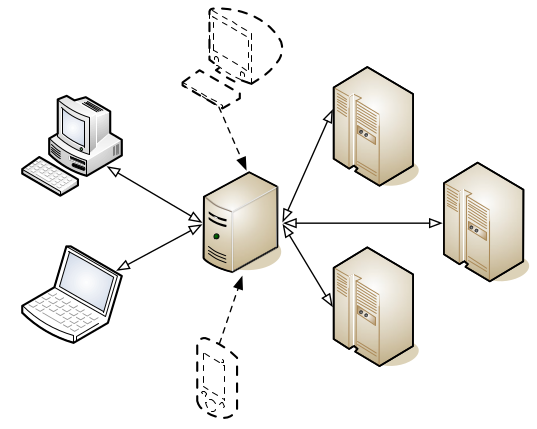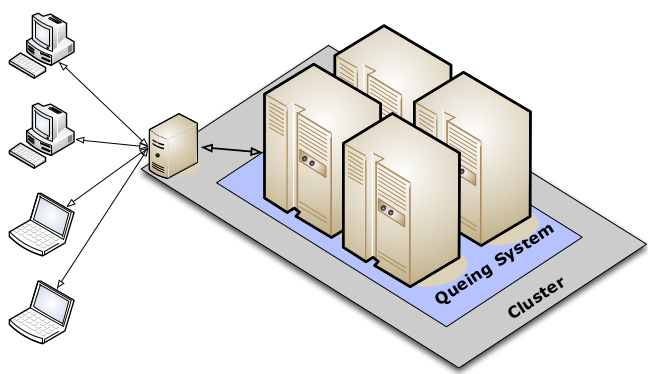MedeA’s JobServer & TaskServer - Indispensable for High Performance Computing
At-a-Glance
MedeA’s ®[1] JobServer & TaskServer is the central unit to manage, monitor, and archive your calculations efficiently and consistently. Thanks to the MedeA’s JobServer & TaskServer, a highly flexible workflow maximizes productivity, even on systems with heterogeneous hardware, and different operating systems.
Key Benefits
- Automated processing of compute protocols and workflows
- Machine driven post-processing and results analysis of calculations with the following compute engines: VASP, LAMMPS, GIBBS, MOPAC, and GAUSSIAN
- Robust leveraging of compute resources from small-sized clusters to high performance computing systems
- Reliable long-term archiving and accounting of computed data
MedeA has a unique three-tiered architecture: The MedeA GUI as the top tier, the JobServer as the middle tier, and the TaskServer as the bottom tier.

For smaller compute clusters, easily install a single central JobServer on a dedicated machine, and install TaskServers on the compute nodes. With this setup, submit calculations from one or more computers, which have the MedeA GUI’s installed. MedeA’s JobServer & TaskServer have web interfaces to manage and monitor jobs, and restrict access if necessary.

Use the JobServer & TaskServer as a gateway for high performance computing in computer centers or the cloud. The JobServer & TaskServer support the most common load balancing systems such as SLURM, PBS/Torque, and GridEngine.

’*MedeA’s* JobServer and TaskServer automatically and reliably process your jobs and calculations while you are thinking about your next groundbreaking innovation in materials science.’
Specifications
- MedeA’s JobServer & TaskServer require a 64-bit Intel or AMD architectures,
and can be driven by various Windows or Linux operating systems.
- Windows Server 2008/2012/2016, Windows 7/8/10
- Linux: CentOS, Redhat, Debian , Fedroa , SuSE , Ubuntu , Oracle
- Memory requirements: 1-4 GB RAM per compute core
- Hard Drive space:
- 5 GB minimum for a full MedeA installation
- 60-180 GB for storing user generated data
- Supported queuing (load balancing) systems are:
- PBS/Torque
- SLURM
- GridEngine
- LSF
- Windows HPC
Key Features
- Compute Management
- Automated processing of compute protocols and workflows
- Web interface designed for on-the-fly job monitoring: hold/resume, restart, etc.
- Flexible administration of computer resources, even in heterogeneous systems
- Developed for multi-user operation
- Results & Data Management
- Quick job search filters for users, status, title, and date
- Efficient and consistent accounting of jobs and relevant files
- Job index in an SQLite database while data is stored on disk
- Full access to all input and output files for authorized users
- Share results and workflows with a team
- Security & Integrity
- JobServer & TaskServer run as system services (daemons) for continuous access
- Secure communication and access via HTTPS
- User authentication restricts access and prohibits data vulnerability
- Maintenance
- JobServer updates and maintenance are possible without interrupting running calculations
- Easy exchange of jobs and data between JobServers
Required Modules
- MedeA Environment
Tightly Integrated Modules
- MedeA Interface Builder
- MedeA VASP
- MedeA MOPAC
- MedeA Gaussian GUI
- MedeA GIBBS
- MedeA EAM
- MedeA Phonon
- MedeA Transition State Search
- MedeA MT
- MedeA UNCLE
- MedeA HT-Launchpad
- MedeA HT-Descriptor
- MedeA Forcefield Optimizer
- MedeA Diffusion
- MedeA Thermal Conductivity
- MedeA Viscosity
- MedeA CED
- MedeA Surface Tension
- MedeA Electronics
Supported Modules
- All MedeA modules